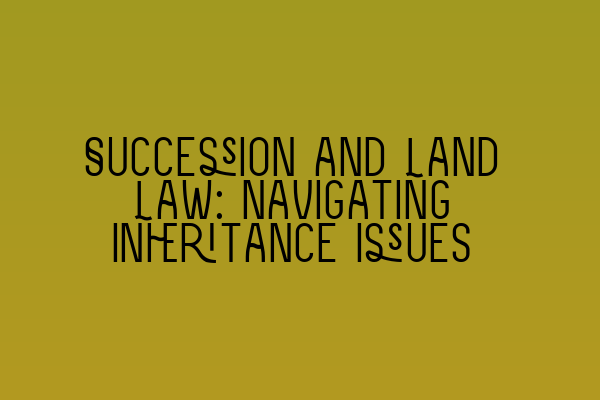Succession and Land Law: Navigating Inheritance Issues
When it comes to succession and land law, understanding and navigating the intricacies of inheritance issues is crucial. Whether you are a beneficiary, executor, or heir, having a solid grasp of the legal principles and processes involved in inheriting land is paramount.
In this blog post, we will delve into the world of succession and land law, exploring the key aspects you need to be aware of to successfully navigate inheritance issues. From understanding the different types of ownership to grappling with inheritance tax and ensuring a smooth transfer of property, we will provide you with a comprehensive overview of this complex area of law.
Types of Ownership
Before delving into inheritance issues, it is essential to understand the types of ownership that can exist in land. The most common forms are:
- Freehold: This is the highest form of land ownership, denoting complete and absolute ownership of the property and the land it sits on.
- Leasehold: In leasehold ownership, an individual owns the property for a specific period of time but does not own the land it sits on. Instead, the land is owned by a landlord, who grants the individual a lease for the property.
- Joint Tenancy: Joint tenancy occurs when two or more individuals jointly own a property. In this form of ownership, if one owner passes away, their share automatically passes to the surviving owner(s).
- Tenancy in Common: In tenancy in common, multiple individuals own a property, but their shares do not automatically pass to the surviving owners upon their death. Instead, their share is distributed according to their will or the laws of intestacy.
Understanding the nature of ownership is vital when it comes to succession and inheritance issues, as it determines how the property will be distributed upon the owner’s death.
Inheritance Tax
One of the key considerations when dealing with inheritance and land law is inheritance tax. Inheritance tax is a tax levied on the estate left behind by an individual upon their death. It is essential to consider the potential implications of inheritance tax when planning for the transfer of property or when dealing with an inherited property.
There are various exemptions and reliefs available for inheritance tax, such as the spouse exemption and the residential nil-rate band. Consulting with a specialist in inheritance tax planning can help ensure that you navigate this complex area of law effectively and minimize the tax liability for yourself or your beneficiaries.
Intestate Succession
When an individual passes away without leaving a valid will, their assets, including land, are distributed according to the laws of intestacy. Intestate succession can present challenges and complexities, particularly if the deceased owned land or properties.
Understanding the rules of intestate succession, which differ across jurisdictions, is crucial when dealing with inheritance issues. It establishes who is entitled to inherit the property and in what proportion. Seeking legal advice from a specialist in succession and land law is highly recommended to ensure a smooth and fair distribution of assets.
The Role of Executors
Executors play a vital role in the inheritance process, particularly when it comes to managing and distributing land. An executor is responsible for carrying out the wishes of the deceased as outlined in their will. This includes gathering and valuing assets, settling debts and taxes, and ultimately transferring the property to the beneficiaries.
It is important to choose an executor who is capable, trustworthy, and knowledgeable in probate and land law. Executorship can be a complex and time-consuming role, requiring a deep understanding of legal procedures and responsibilities. Seeking professional advice and guidance can significantly assist in fulfilling the duties of an executor.
Professional Legal Assistance
Given the complexities and legal implications involved in succession and land law, it is strongly recommended to seek professional legal assistance. A solicitor specializing in property law and land law can provide the necessary expertise and guidance to navigate inheritance issues smoothly and efficiently.
SQE Property Law & Land Law is a renowned law firm specializing in property and land-related matters. Our team of experienced solicitors can provide you with the necessary advice and support needed to effectively navigate the complexities of succession and inheritance.
For further reading on related topics, check out the following articles:
- Misrepresentation in Contracts: Unveiling Deceptive Practices
- SQE Contract Law: Analyzing Landmark Cases and Influential Judicial Decisions
- Understanding Contractual Capacity: Rights and Limitations
- Interactive SQE Mock Tests for Contract Law: Test Your Knowledge
- Join Our SQE Contract Law Webinars: Expert Insights and Guidance
At SQE Property Law & Land Law, we also offer webinars providing expert insights and guidance on various legal topics. Join us to enhance your understanding of property law and stay updated on the latest legal developments.
In conclusion, succession and land law require a deep understanding of the legal frameworks governing inheritance, ownership, and taxation. The complexities involved necessitate professional legal assistance to ensure a smooth and fair transfer of land. By consulting with a specialist in property law and inheritance, you can navigate the intricacies of inheritance issues confidently and efficiently.
